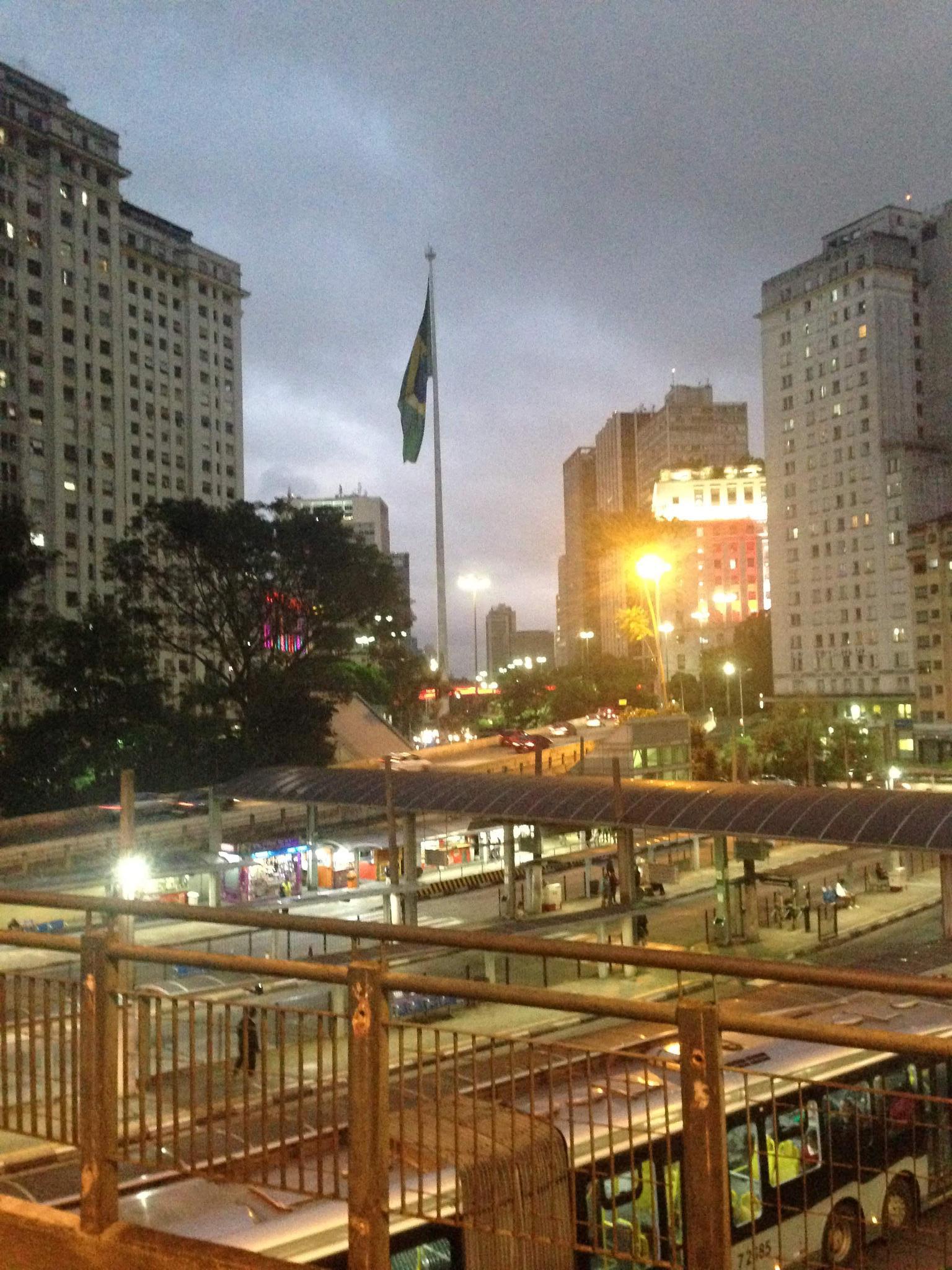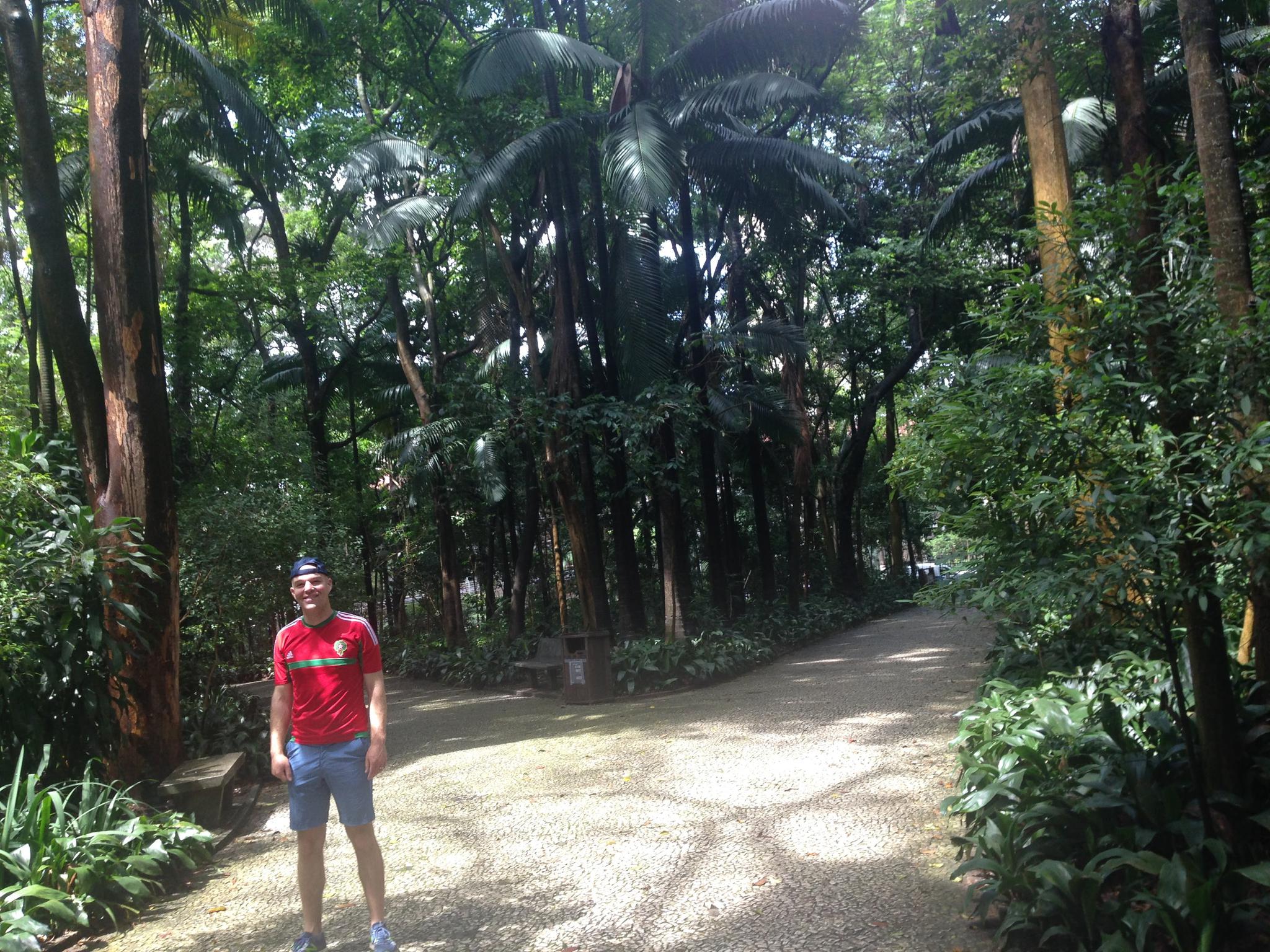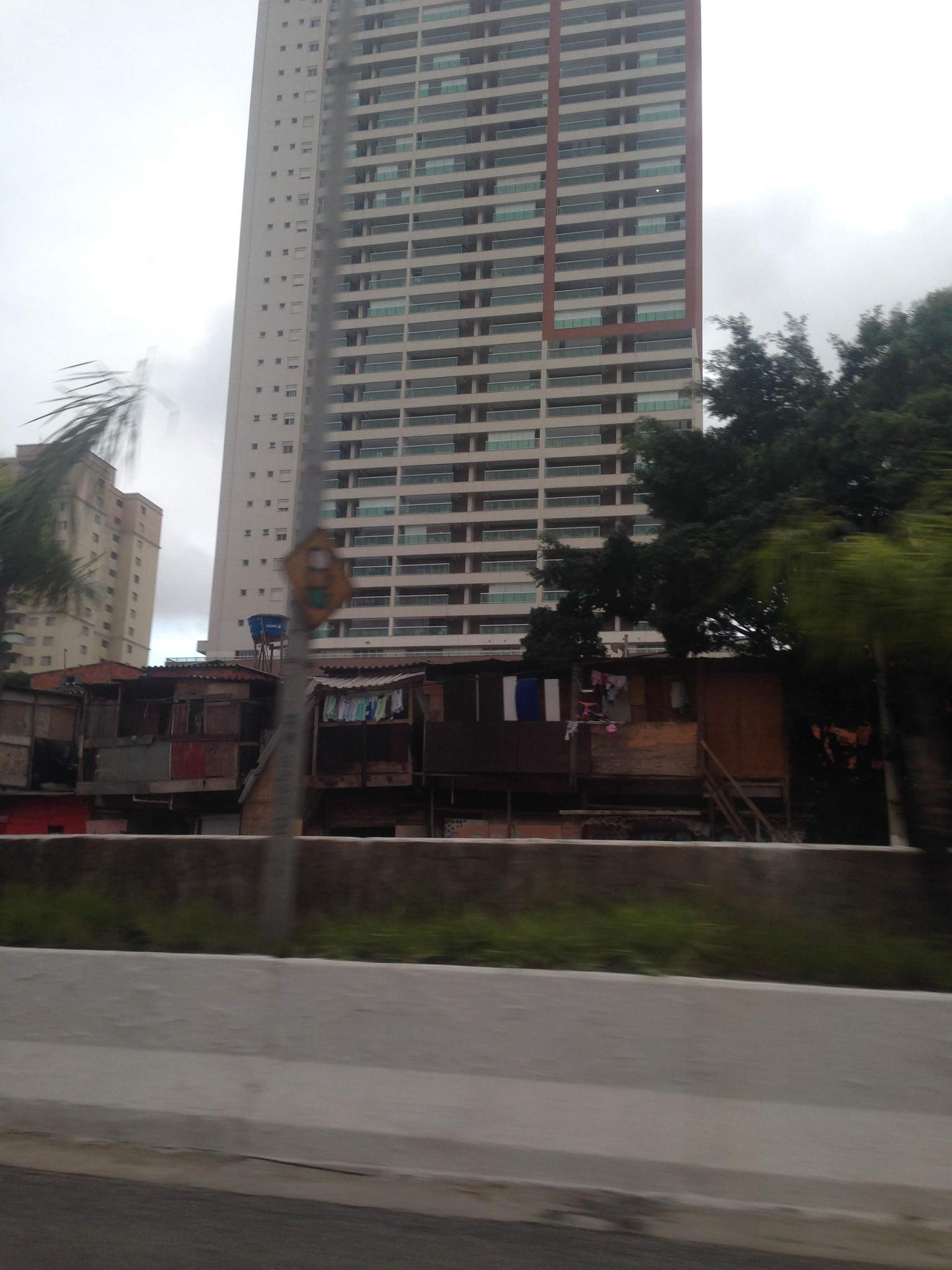Childhood Obesity and Installments to Pay for Chocolate
Brazil's security and economic crises fail to stop the nation's growing consumerism
City of São Paulo, Brazil
December 2018
The homeless problem hits you in the face. There is no neighborhood where you do not see it. The people are outside stores and restaurants begging. If you eat on a veranda at a restaurant, they will ask for food. They, and their things, occupy alleyways. Parks are obvious gathering spots, too. This does not compare to Seattle or San Francisco’s problem, I think. Whole families, the young, and people who look nothing like addicts are the homeless here. The sheer number and diversity is overwhelming.
Brazil’s largest city is the center of commerce for the country and thus has experienced a major migration from poorer northern regions during the last few decades. During the recent economic crisis that began in 2014, the numbers of homeless exploded in São Paulo, residents tell us. Many who came looking for jobs lost them. Others who lost jobs in other parts of Brazil came to São Paulo looking for work. The result was the human tragedy we see today.
In a cafe that straddles a busy street, we drink açaí smoothies. Açaí is a delicious, purple Amazonian fruit unique to Brazil and other Amazonian nations. As we drink our smoothies, a homeless man asks the person at the bar for an espresso. She looks around to make sure her manager is not looking. She makes the man the espresso quickly, puts it into a to-go cup, and he offers her 1 real, 20 percent of the actual price. She does not accept, and waves him on. He says god bless and hustles along. A stranger helping a stranger in South America’s largest city.

I ask our Brazilian friend, Juliana, if it is common that servers will give free drinks or food to beggars. She says that Brazilians understand that life is hard and they are disposed to help each other. There is a camaraderie of sorts amongst the population. “We all suffer and struggle together,” she says.
Juliana is graduating from university next week with a degree in nutrition. Her goal is to work in a restaurant as a nutritionist, although any related job will do. She is not optimistic about finding a job in this economy.
Juliana is passionate about helping her parents lead healthier lives. Her parents, like many Brazilians, do not exercise enough and eat too much processed and sugary food. Juliana laments that most children do not play outside because the streets are unsafe. Sadly, our Brazilian friends’ children do not play outside for this very reason. This has led to greatly increased child obesity in recent years. Currently, 1 in 3 Brazilian children are overweight. Unsafe streets are a double-whammy of danger and overweight children.
The lack of security means apartments resemble prisons. At multiple apartments of friends we visit, we go through four doors or bars to enter the apartment. One iron gate in front of the building front door, the building door itself, then the same double-layer of gate and door to finally enter the apartment itself. Windows on the lower floors always have bars as well. People prefer to live in apartments on higher stories to prevent break-ins.
The nightly news is filled with reports of murder. People frequently tell us to be careful and to stay off the streets. While Brazil is a violent society, I start wondering if the paranoia of this society is larger than the actual violence. In a small apartment, the TV is an effective entertainer. If only the hours in front of the TV could burn calories.
We go to a Korean restaurant in one of São Paulo’s Asian neighborhoods with Juliana. I recommend we meet in a park outside a metro station and walk to the restaurant together. She says this is a bad idea — it may be unsafe in the park, even at 2 pm. Instead, we meet at a well-known Asian food market and head to the restaurant from there.
Over Korean food, Juliana says she lives in fear not only of robbery but also sexual violence. Brazilian men are awful, she says, and do not respect women. They do not listen to a woman’s desires and are machistas. She says she was a victim of sexual assault in her own home. She avoids waiting in parks alone, even in daylight.
Juliana’s comment about Brazilian men reminds me of a conversation with our friend Monica in the southern Brazilian city of Caxias do Sul. Monica is an independent, single woman in her mid-thirties who co-owns a small business. She says that Brazilian men are intimidated by independently-minded women like her. Men assume Monica’s independence means she will not be a loyal girlfriend. I ask if men equate loyalty with doing exactly what they want. Monica nods. She says that the traditional Italian culture that suppresses women and expects them to obey men is still strong in Caxias do Sul.
The fear of female independence in Brazil amongst men is not limited to Caxias, however, as people in different parts of the country tell me that many men view women as possessions and have a strong machista attitude. Crimes of passion are common and Netflix has a multi-season Brazilian show about the topic. (This is clearly not simply a Brazilian problem but rather a common problem in Brazil.)
After finishing our Korean meal with Juliana, my wife and I engage in conversation with the Korean owner of the restaurant about life in São Paulo as a Korean. She says it is very tough. The owner says she is afraid that every time her family members leave the house they will not come home. Her family knows people who have been kidnapped and murdered.
In addition to issues of security and fear, her business has suffered as a result of the recession. People have no money to eat, much less in restaurants. The owner really wants to go back to Korea, she confesses. She came to São Paulo after the family business failed in Korea about 15 years ago. She would not recommend moving to Brazil.
After our Korean meal, we walk to a bookstore with Juliana. The prices of books are higher than in the United States despite far lower wages. Juliana says that many lower-class Brazilians see book reading as the domain of the upper-classes. I point out that there are ways to download books for free online. No matter, she says. It is cultural. The lower-classes think it is not their place to read so they do not.
Juliana, however, reads novels despite her working-class background. She is about to get her university degree and studied in England for a semester. She aspires to be a stable member of the middle class. Her father is a construction laborer from the poor nordeste (northeast of Brazil) who, during the boom years of the 2000s, did quite well despite his low education level. Now, with the economic crisis since 2014, there have been periods where he has struggled to find consistent work.
Juliana is an open homosexual who has had multiple partners, some of whose families have supported their daughters’ homosexuality while others who have not. Her current partner was expelled from her evangelical church for being gay. Juliana says that thanks to Jair Bolsonaro’s open homophobia the atmosphere for gays has worsened recently.
The next day, I see a gay couple in a São Paulo metro station publicly making out. I ask another Paulista friend (Paulista means someone from São Paulo), Thomas, whether open displays of homosexuality are common. He says that in the center of São Paulo open displays of homosexuality are common but that in the outlying neighborhoods this would be rare. Homosexuality in Brazil, as in many parts of Latin America, is far more accepted in the major metropolises than by the population at large. Gay marriage was legally approved in Brazil prior to its legalization in the United States. However, in a traditionally Catholic country with a very large and influential Evangelical Christian population, legal protections do not signify broad societal acceptance.
Thomas, like Juliana, is the son of a construction laborer who moved to São Paulo from the nordeste. Similar to Juliana, Thomas and his sisters were the first generation of their family to go to university. Despite attending university, Thomas has struggled to find consistent employment. Thomas, at 44, is now retraining to become a secondary school Portuguese teacher. However, given the cost of tuition he has had to take time off.
His previous job, teaching Spanish to the elderly that helped pay for his education, was cut during the recent economic crisis. “All I want is a job,” Thomas says. “However, life could be much worse.”
Thomas benefited from the Brazilian boom of the 2000s. The steady employment and rising wages allowed Thomas to travel to multiple countries in South America and learn Spanish. “I saw extreme poverty in Peru. I have seen extreme poverty in Brazil. At least I have a roof over my head.”
Thomas lives in an apartment owned by his mother, very close to where she lives. He pays no rent to her. His father recently passed away and by living close he can keep his mother company.
Thomas’ family, like Juliana’s, owns their residence. This was previously unimaginable to the migrants from the nordeste. Thomas’ father benefited from the construction boom in São Paulo just as Juliana’s did. In Juliana’s case, her mother had a little property she inherited when her entire family died when an airplane crashed into their house. Juliana’s mother was the family’s sole survivor. Thomas’ father bought the family's residence before São Paulo real estate got too expensive.
Very few people we meet in São Paulo are actually from São Paulo. The migration to São Paulo from the nordeste and other poorer regions has been massive in the last few decades. The ex-president of Brazil, Lula, migrated with his family from the nordeste to São Paulo.
Igor, the LATAM mechanic we met in a previous article, is also the son of migrants from the nordeste. His father was a bus driver now retired. Igor recently bought a used Toyota sedan that looks quite well maintained and appears just a few years old. Igor is proud of his new purchase as he gives us a tour of the features of the vehicle. To help pay for the car, he drives for Uber in his time off from work. Igor’s LATAM salary -- good by Brazilian standards -- is not enough to maintain his consumerist lifestyle.
Igor admits to loving fast-food like Burger King, a relative luxury in Brazil when the prices are compared to the average salaries. Igor also enjoys spending shopping in malls. A Brazilian journalist named Felipe tells me that the irony to Brazil’s recent economic troubles is that there is still more money in Brazil than at any time in its history. More people have access to consumer goods than ever before and their appetite was whetted by the economic boom of the 2000s. Many have lost their jobs since but still desire the lifestyle. I read an article in a Brazilian news site about a beggar who received a cash payment from a charity that was intended for food for his family who went to buy new Nikes. Others, like Igor, work two jobs to permit their consumption.
We meet Igor and his wife at a beautiful botanical garden in south São Paulo. Interestingly, it is the first time they have been. I suggested the gardens since the pictures looked pretty. After we stroll around for an hour or so, Igor suggests we go to his favorite mall that is a fifteen minute drive. Igor says that he rarely goes to parks to spend time, preferring malls, movie theatres, or restaurants. A shame, I think, because São Paulo has a number of very nice large parks. But parks are also associated with junkies, as multiple Brazilians tell me. Some of the smaller ones also are in disrepair. In one small park, I leaned back on a bench and the back broke.

As we drive to the mall, we see slums, or favelas, piled next to rows of modern apartment buildings. The favelas likely house those that came from the nordeste late after the initial boom.
In the United States, the rich and poor often live far apart in different neighborhoods. In Brazil and other parts of Latin America, the rich and poor live on top of each other, making the contrast more striking. In malls, however, there is no sign of the poor. Perhaps purposefully, the mall is in a neighborhood far from the metro. Owning a car is not an absolute requirement but seems necessary to get to the mall. In our humble traveler clothes, my wife and I stand out amongst the crowds of well dressed Brazilians. Every brand name store is there. We pass the Harry Potter store. Igor proudly says that he bought his Harry Potter shirt there.

Despite this being a chic mall, the prices appear low. Then I realize that the prices are listed in monthly installments. Nikes may be 120 dollars but they will say 20 dollars on the price tag. In small letters next to the 20 it will say “X6”.
This is a common gimmick in Brazil and other Latin American nations. Everything can be purchased in parcelas, or installments. Even small items like cheap sunglasses or meals are purchasable in parcelas. For the 120 dollar Nikes I can elect to have 20 dollars appear on my credit card for six months straight.
Igor takes us to a newly opened gourmet chocolate bar. The chocolate is delicious, but one bowl runs about 7 U.S. dollars. This is high given the minimum wage is under 400 U.S. dollars a month. And yes, you can pay in parcelas. Parcelas give one instant gratification and a sense of belonging to Brazil’s upwardly mobile class.
After our chocolate, Igor and his wife drive us to the closest metro station ten minutes away. The metro is another world. Brazil’s humble classes pack the trains, their clothes and faces showing the wear of poverty. Given the appearance of the riders, my wife remarks that it is hard to imagine anyone from the metro in the mall. Brazil is a study in contrasts, one beside the other.
We arrive back at our AirBnb in the heart of the city. Igor texts me to see if we would like to meet for a fancy meal of all you can eat Brazilian churrasco (bbq) before we leave. He texts us the menu. It is twenty-five dollars a person for dinner, a very substantial amount in Brazil. We consider but make an excuse about already having plans. Enough Brazilian consumption for a while.
